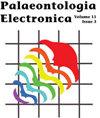北美洲东南部最古老的短吻鳄记录
IF 1.5
4区 地球科学
Q1 Earth and Planetary Sciences
引用次数: 0
摘要
短吻鳄属以体型庞大的掠食性物种为代表,在北美东南部(中新世早期)至少有1800万年的历史,也就是现在的美国东南部。然而,该属的第一次出现是来自一个体型较小的物种,a . prenasalis,已知于南达科他州和内布拉斯加州,大约有3400万年的历史(始新世晚期到渐新世早期)。A. prenasalis的祖先同样体型小,来自大平原。这一千六百万年的差距留下了关于短吻鳄从现在的大平原到北美东南部的到来和体型变化的悬而未决的问题。最近研究了佛罗里达的化石材料,发现了该地区最古老的短吻鳄(大约2800万到2600万年前)。保存完好的前颌(UF 422816)具有鳄鱼的诊断前颌“缺口”。来自这个和佛罗里达另外两个渐新世遗址的其他材料也表明短吻鳄存在。这些包括发育良好的骨皮,这表明可能在小的体型下成熟。到目前为止,在该地区还没有发现这个时期(或更早时期)更大的短吻鳄的记录,这可能表明短吻鳄的体型直到中新世才增加本文章由计算机程序翻译,如有差异,请以英文原文为准。
Oldest record of Alligator in southeastern North America
The genus Alligator has been represented by large-bodied, predatory species in southeastern North America for at least 18 million years (early Miocene), in what is now the southeastern United States. However, the first occurrences of the genus were from a smaller-bodied species, A. prenasalis , known from South Dakota and Nebraska that are about 34 million years old (latest Eocene to earliest Oligocene). Ancestors of A. prenasalis were likewise small-bodied and are from the Great Plains. This 16 mil-lion-year-gap has left open questions regarding the arrival and body size shift of Alligator from what is now the Great Plains to southeastern North America. Recently studied fossil material from Florida exhibits the oldest occurrence of Alligator in the region (about 28–26 million years ago). A well-preserved premaxilla (UF 422816) bears the diagnostic premaxillary 'notch' of Alligator . Additional material from this and two other Oligocene sites in Florida are indicative of Alligator as well. These include well-devel-oped osteoderms, which suggest possible maturity at small body size. As of now, no records of larger Alligator from this time (or older) have been recovered from the region, possibly indicating body size may not have increased in Alligator until the Miocene
求助全文
通过发布文献求助,成功后即可免费获取论文全文。
去求助
来源期刊

Palaeontologia Electronica
地学-古生物学
CiteScore
3.60
自引率
0.00%
发文量
20
审稿时长
>12 weeks
期刊介绍:
Founded in 1997, Palaeontologia Electronica (PE) is the longest running open-access, peer-reviewed electronic journal and covers all aspects of palaeontology. PE uses an external double-blind peer review system for all manuscripts. Copyright of scientific papers is held by one of the three sponsoring professional societies at the author''s choice. Reviews, commentaries, and other material is placed in the public domain. PE papers comply with regulations for taxonomic nomenclature established in the International Code of Zoological Nomenclature and the International Code of Nomenclature for Algae, Fungi, and Plants.
 求助内容:
求助内容: 应助结果提醒方式:
应助结果提醒方式:


